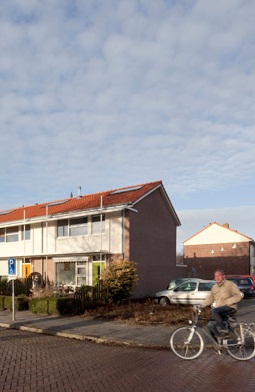Energiesprong (Energy jump)
| Function / Domain: | energy, building |
| Illustration of: | new financial arrangements |
Energiesprong (Energy jump) is a Dutch, temporary innovation programme that started in 2010 and that is funded by the Dutch national government. The programme's aim is to create large scale demand and supply for houses and other buildings with zero energy costs or better (E-0 houses). The programme approach is based on a system innovation perspective.
Since 2014 Energiesprong is making efforts to internationalise its approach.
Focus on social barriers
Technologies and materials for E-0 houses were available, but at the start of the programme the prices were quite high. A first step in the programme thus has been to improve the price/performance ratio. Indeed, since the start over 30% has been realised. This has allowed for large scale application.
In these circumstances, in the second phase the programme focused on innovative integration of technologies and addressing social barriers. For example, changes in the process and standard procedures in building and renovation were worked on, and innovation in financial arrangements, mortgage lending rules and regulations. Concrete activities included experiments with new specification procedures for the renovation, reducing the time for renovation of houses to about 10 days (7 being the new goal), making the renovation easy for house owners and tenants and a learning programme with different stakeholders. To convince the financers that their investments were worthwhile and secure, Energiesprong lobbied for a long-year energy performance warranty on the refurbished house. And it brokered a deal between housing associations and builders to refurbish 111,000 houses to Net Zero Energy (E=0) levels in the Netherlands.
New financial arrangements
Below is information on one the new financial arrangements that Energiesprong has developed, for the private houses sector. Other such arrangements have been developed for the retail sector and office market and housing cooperative.
In the Netherlands mean energy bills per average household are €2.200 per year. When houses are made with zero energy costs, this means saving for the owners. The business model entails that these (future) savings are used for the E-0 renovation. When 4 million private houses would be included in the programme per year (financial data of 2012), almost 9 billion Euro would be available for renovation. Sinecure this is a recurring revenue stream so when used for financing this means an investment potential of >15 times the yearly savings. The business case could run several years.
The positive impacts of the new arrangement are:
- Work for the next ten years for the building industry
- Zero energy houses will have a positive impact on the market value of the houses, because of attractiveness due to decreased living expenses
- For house owners: the spending power of the owners would be increased with about €2.200 per year, once the renovation is paid for
- No more increasing energy bills.
‘Multipliers'
The Energiesprong programme has started with small-scale projects. The programme targets however are much higher. For that reason programme leaders identified ‘multipliers': forces and developments that could support the realisation of the Energiesprong targets. The most important multipliers that are:
- The increase in purchasing power of private house owners
- Increasing value of houses
- More value stable pledge of mortgages
- Employment and economy developments
- The increasing number of construction firms and builders that is interested in sustainable building and in investing in it.
Sources
- http://energiesprong.nl/transitionzero/, including videos
